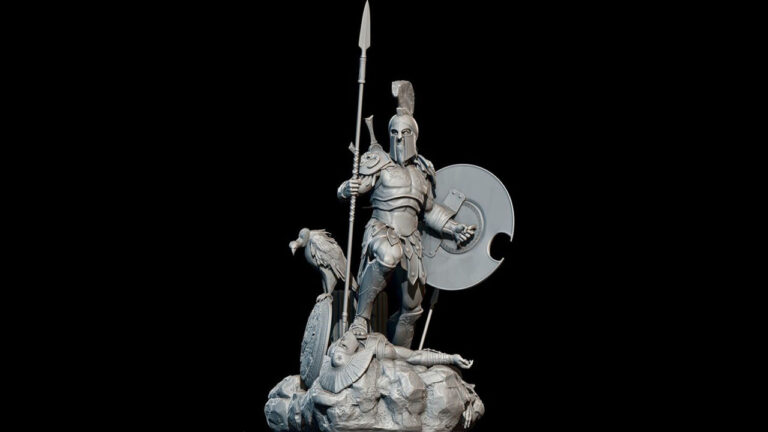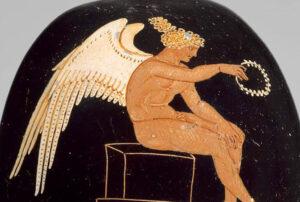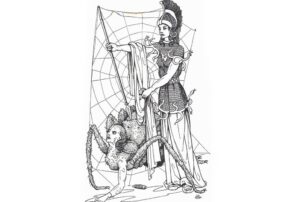Table of Contents
Who is Ares?
Ares is an ancient Greek deity associated with war, violence, and conflict. The Greeks depicted Ares as a powerful and often belligerent god, embodying the brutal aspects of warfare. Ares played a significant role in Greek mythology, being the son of Zeus and Hera, and he was considered one of the Twelve Olympians. As the god of war, Ares was both feared and revered, and he was often invoked by soldiers seeking his favor in battle.
Why Was Ares so Hated By the Other Gods
The other gods harbored animosity towards Ares primarily because of his penchant for violence and chaos. Ares, the ancient Greek god of war, relished in the brutality of conflict, which often led to widespread suffering and destruction. His aggressive and impulsive nature, coupled with a lack of strategic finesse, made him a disruptive force among the gods. Ares’ love for battle and bloodshed clashed with the more orderly and disciplined aspects valued by the other deities. Consequently, his actions and demeanor fueled resentment among his divine counterparts, contributing to the negative perception and disdain directed toward Ares.
Why Wasn’t Ares Worshiped By The People
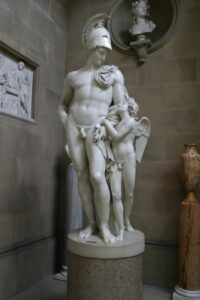
The people refrained from worshiping Ares primarily due to the perceived negative attributes associated with the ancient Greek god of war. Ares’ domains of violence and conflict were seen as disruptive and chaotic, in contrast to the more revered qualities embodied by other gods. The Greeks valued strategic warfare and honorable conduct in battle, qualities often lacking in Ares, who was viewed as impulsive and brutal. As a result, the general populace tended to favor deities associated with more positive aspects of life, such as Athena, the goddess of wisdom and strategic warfare, over Ares. The lack of widespread worship for Ares reflected the cultural preference for gods who embodied virtues and ideals that aligned with the values of the ancient Greek society.
Did Ares Have Any Redeeming Qualities
Ares, the ancient Greek god of war, possessed few redeeming qualities, as his nature was primarily characterized by aggression and a love for violence. However, it could be argued that his fierce loyalty to certain individuals, particularly his children and those he favored in battle, was a redeeming aspect. Ares was known to fiercely protect those he cared about, exhibiting a form of familial devotion. Despite this, his impulsive and destructive tendencies often overshadowed any positive qualities, making him a deity who was not widely admired or revered among the ancient Greeks.
Ares Defends His Daughter, Alcippe
Ares defended his daughter, Alcippe, exhibiting his fierce protective nature. When Alcippe found herself in a perilous situation, Ares, the ancient Greek god of war, intervened with unwavering determination. His actions showcased a rare display of paternal concern and a willingness to fiercely safeguard his offspring. In the face of danger, Ares embraced his role as a protective father, embodying the more positive aspect of familial loyalty amid the typically tumultuous and aggressive nature associated with the god of war.
Origins
The origins of Ares, the ancient Greek god of war, trace back to the pantheon of deities in Greek mythology. Ares is the son of Zeus, the king of the gods, and Hera, the queen of the gods. His birth is situated within the context of the divine family structure, marking him as one of the Twelve Olympians.
As a deity, Ares embodies the concept of war and conflict, representing the brutal and chaotic aspects of warfare. The evolution of his character and prominence in Greek mythology is linked to the broader cultural and religious beliefs of the ancient Greeks. Ares, with his distinctive domain and characteristics, became an integral part of the pantheon, playing a role in various myths and stories related to battles, conflicts, and the struggles of heroes.
Ares and the Aloadae
In Greek mythology, Ares played a pivotal role in the narrative involving the Aloadae, Otus, and Ephialtes, twin giants with immense strength and ambitions. Ares became entangled in their story when the Aloadae sought to defy the gods and ascend to greater power.
The Aloadae hatched a daring plan to imprison Ares, the god of war, in a bronze jar to secure their dominance over the divine realm. However, their plot was thwarted by Hermes, who cleverly guided Ares to safety. The Aloadae’s audacious attempt to subdue Ares showcased the god’s vulnerability and the cunning intervention of other deities in thwarting mortal challenges to divine authority. The tale underscored the consequences of mortal ambition and the resilience of the gods in overcoming such threats.
Ares Is Sent Away From Mount Olympus
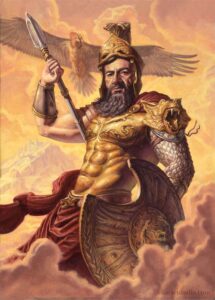
The gods of Mount Olympus expelled Ares, the ancient Greek god of war, due to his disruptive and belligerent behavior. Ares, known for his love of conflict and chaos, often clashed with the more orderly and disciplined deities residing on Mount Olympus. The gods, weary of his impulsive and violent nature, collectively decided to banish Ares from their divine abode.
This expulsion reflected the divine displeasure with Ares’ actions, as he found himself cast out from the revered assembly of the Twelve Olympians. The event underscored the consequences of Ares’ contentious behavior, emphasizing the gods’ intolerance for the disruptive qualities associated with the god of war.
Ares Has an Affair with Aphrodite
Ares engaged in an affair with Aphrodite, the goddess of love and beauty, despite her marriage to Hephaestus. The illicit relationship between Ares and Aphrodite unfolded in secrecy, with the two deities succumbing to their passions and desires. The affair, characterized by clandestine encounters, stirred tumultuous emotions among the gods of Mount Olympus.
Hephaestus, Aphrodite’s husband, eventually discovered the affair and devised a cunning plan to expose the unfaithful couple. The revelation of Ares and Aphrodite’s relationship became a source of scandal and discord among the gods, showcasing the consequences of their clandestine actions and the intricate web of relationships within the divine pantheon.
Ares Tries to Avenge Cycnus
Ares attempted to avenge Cycnus, a formidable warrior, after he fell in battle. Consumed by grief and fury over Cycnus’s death, Ares sought retribution against the Greek hero, Achilles, who was responsible for Cycnus’s demise.
In his quest for vengeance, Ares assumed the form of a warrior, joining the fray on the side of the Trojans during the Trojan War. However, his intervention did not alter the course of the conflict, and he faced opposition from other gods who favored the Greeks.
Ares’ desire for revenge highlighted the emotional entanglements and personal vendettas that often characterized the actions of the gods in Greek mythology, adding a layer of human-like emotions to these immortal beings.
Ares in the Trojan War
Ares actively participated in the Trojan War, aligning himself with the Trojans in their conflict against the Greeks. The god of war brought his martial prowess to the battlefield, influencing the course of the war with his ferocity and combat skills.
Ares sided with the Trojans, driven in part by his desire for vengeance against the Greeks for their role in the death of his son, Cycnus. Taking on the guise of a warrior, Ares engaged in direct combat, sowing chaos and bolstering the Trojan forces.
Despite his formidable presence, Ares faced opposition from other gods supporting the Greeks, leading to divine conflicts that mirrored the mortal struggles below. Ares’ active involvement in the Trojan War exemplified the direct influence of the gods on human affairs in Greek mythology, particularly in the context of epic battles.
Children of Ares
Ares, the god of war in Greek mythology, has various notable offspring:
Phobos and Deimos: Phobos and Deimos, born to Ares and Aphrodite, embody fear and terror. They accompany their father into battle, serving as divine symbols of dread.
Harmonia: Harmonia, the daughter of Ares and Aphrodite, is associated with harmony and concord. Despite her divine parentage, she brings a contrasting element of peace.
Adrestia: Adrestia is a daughter of Ares and the personification of vengeance and retribution. She represents the consequences of war and the avenging force that follows.
The Erotes: The Erotes, such as Eros (Cupid), are sometimes considered offspring of Ares and Aphrodite. They are associated with love and desire, creating a thematic juxtaposition with their warlike parent.
The Amazons: In some myths, Ares is linked to the creation of the Amazons, a tribe of warrior women. The details of their origin and Ares’ involvement vary in different accounts.
Alcippe: Alcippe is mentioned as a daughter of Ares. Her story involves Ares defending her during a conflict, showcasing the god’s protective nature.
King Diomedes: In certain accounts, King Diomedes is considered a son of Ares. He is known for his role in the myths involving the Twelve Labors of Heracles.
These offspring contribute to the multifaceted nature of Ares, depicting both the destructive aspects of war and, in some cases, elements of harmony, love, and retribution.
Places Named for Ares
Several places are named in honor of Ares, the ancient Greek god of war:
Areopagus: The Areopagus, located in Athens, was a hill where the council of elders, the Areopagus Council, convened. The name reflects the association with Ares, as the hill was believed to be a site where Ares faced judgment for the murder of Poseidon’s son.
The Isle of Ares: The Isle of Ares is a mythical location associated with the god of war. The exact nature and characteristics of this island vary in different tales, but it is often depicted as a place connected to Ares and his warrior ethos.
The Garden of Ares: The Garden of Ares is mentioned in some ancient texts, often in the context of myths or poetic imagery. It is a mythical or symbolic location that emphasizes the warlike nature and attributes of Ares.
The Planet Ares: While not a physical place on Earth, the name Ares has been used to refer to the planet Mars in astronomy. This association comes from the Roman identification of Ares with their own god of war, Mars. The red color of Mars in the night sky is reminiscent of blood, further connecting it to the martial aspects of Ares/Mars.
These locations and celestial associations highlight the cultural and symbolic significance of Ares in ancient Greek and Roman traditions.
Qestions and Answers
Ares was the god of what
Ares was the god of war, embodying the violent and tumultuous aspects of armed conflict.
What is Ares' symbol?
Ares is often associated with symbols such as the spear and the shield, representing warfare and battle.
What is Ares' Roman name?
In Roman mythology, Ares is identified with the god Mars.
Who are Ares' parents?
Ares is the son of Zeus, the king of the gods, and Hera, the queen of the gods.
Who is Ares' father?
Ares' father is Zeus, the chief deity in Greek mythology.
What are Ares' powers?
Ares possesses powers associated with war, including combat prowess, strength, and the ability to incite conflict.
What is Ares known for?
Ares is known for his association with war, violence, and the chaotic nature of battle in Greek mythology.
How to pronounce Ares?
Ares is pronounced as "Air-eez."
How to get Ares' armor in God of War?
In the context of the God of War video game, obtaining Ares' armor involves progressing through the game's storyline and completing specific challenges. The details may vary depending on the specific installment of the game.
Who is Ares married to?
Ares is married to Aphrodite, the goddess of love and beauty.
Who killed Ares?
In Greek mythology, Ares was not killed; however, during the Trojan War, he was wounded by the hero Diomedes.
What does Ares want to control?
Ares desires control over the chaos and violence of war. He revels in the conflict and destruction associated with armed struggles.
How many children did Ares have?
Ares had several children, including Phobos, Deimos, Harmonia, Adrestia, and others.
What is Ares' weakness?
Ares' impulsive and reckless nature, along with his penchant for brutality, is considered a weakness.
What does Ares look like?
Ares is often depicted as a powerful and muscular god, clad in armor and wielding weapons like a spear or sword. His appearance emphasizes his martial attributes.
How was Ares born?
Ares was born to Zeus and Hera, joining the pantheon of gods on Mount Olympus.
How did Ares die?
In classical mythology, Ares does not have a specific death story. He is generally considered an immortal deity.
Who did Ares marry?
Ares married Aphrodite, forming a divine union between the god of war and the goddess of love.
